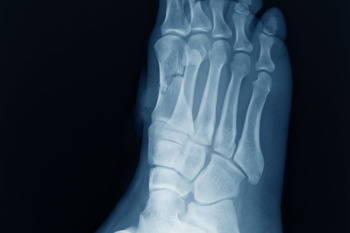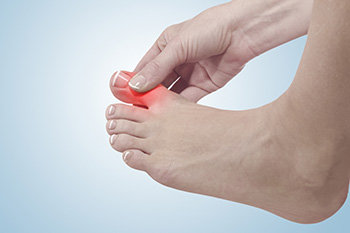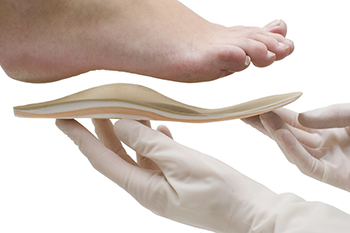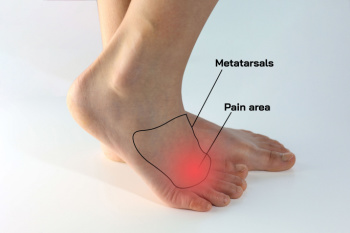Connect With Us
Blog
Items filtered by date: September 2024
Understanding Cuboid Syndrome in Athletes

Cuboid syndrome is a common but often overlooked cause of lateral foot pain in athletes, particularly in sports involving running, jumping, and sudden direction changes. It occurs when the cuboid bone, located on the outer side of the foot, becomes partially dislocated or misaligned. Athletes may experience sharp pain, swelling, and difficulty bearing weight. Diagnosis involves a physical examination, including palpation of the cuboid area, range of motion tests, and sometimes imaging like X-rays to rule out fractures. Treatment typically starts with rest. A podiatrist may try to realign the cuboid bone with manual manipulation. They may also use taping or orthotics to support the foot and prevent recurrence. If you participate in sports and have pain on the side of your foot, it is suggested that you schedule an appointment with a podiatrist for a proper diagnosis and treatment.
Cuboid syndrome, also known as cuboid subluxation, occurs when the joints and ligaments near the cuboid bone in the foot become torn. If you have cuboid syndrome, consult with Dr. Eddy Caldwell from Foot Care of Northeast Arkansas, P.A.. Our doctor will assess your condition and provide you with quality foot and ankle treatment.
Cuboid syndrome is a common cause of lateral foot pain, which is pain on the outside of the foot. The condition may happen suddenly due to an ankle sprain, or it may develop slowly overtime from repetitive tension through the bone and surrounding structures.
Causes
The most common causes of cuboid syndrome include:
- Injury – The most common cause of this ailment is an ankle sprain.
- Repetitive Strain – Tension placed through the peroneus longus muscle from repetitive activities such as jumping and running may cause excessive traction on the bone causing it to sublux.
- Altered Foot Biomechanics – Most people suffering from cuboid subluxation have flat feet.
Symptoms
A common symptom of cuboid syndrome is pain along the outside of the foot which can be felt in the ankle and toes. This pain may create walking difficulties and may cause those with the condition to walk with a limp.
Diagnosis
Diagnosis of cuboid syndrome is often difficult, and it is often misdiagnosed. X-rays, MRIs and CT scans often fail to properly show the cuboid subluxation. Although there isn’t a specific test used to diagnose cuboid syndrome, your podiatrist will usually check if pain is felt while pressing firmly on the cuboid bone of your foot.
Treatment
Just as the range of causes varies widely, so do treatments. Some more common treatments are ice therapy, rest, exercise, taping, and orthotics.
If you have any questions, please feel free to contact our office located in Jonesboro, AR . We offer the newest diagnostic and treatment technologies for all your foot care needs.
Bypass Bunion Surgery with Custom Orthotics

Considering bunion surgery? Think again. Custom Orthotics offer a non-surgical approach to reduce pain and restore foot function. Customized to your foot's structure, they realign and redistribute pressure, alleviating bunion discomfort. Experience the freedom of movement without the downtime and risks of surgery. Contact our office to make an appointment.
What Is Hallux Rigidus?

Hallux rigidus is a form of arthritis that affects the big toe joint, leading to stiffness and pain. It occurs when the cartilage in the big toe deteriorates, restricting movement and causing discomfort. Early symptoms include pain and swelling at the base of the big toe, particularly during activities like walking or bending the toe. As the condition progresses, the joint becomes increasingly rigid, making it difficult to move the toe and potentially leading to complications, such as altered gait and additional strain on other joints. Hallux rigidus can affect anyone but is more common in middle-aged individuals and those with a family history of arthritis or previous foot injuries. Diagnosis typically involves a physical examination and imaging tests like X-rays to assess joint damage and bone changes. If you are experiencing persistent big toe pain, it is suggested you schedule an appointment with a podiatrist who can provide a comprehensive evaluation and effective treatment options.
Toe pain can disrupt your daily activities. If you have any concerns, contact Dr. Eddy Caldwell of Foot Care of Northeast Arkansas, P.A.. Our doctor can provide the care you need to keep you pain-free and on your feet.
What Causes Toe Pain?
Most severe toe pain is caused due to a sports injury, trauma from dropping something heavy on the toe, or bumping into something rigid. Other problems can develop over time for various reasons.
Toe pain can be caused by one or more ailments. The most common include:
- Trauma
- Sports injury
- Wearing shoes that are too tight
- Arthritis
- Gout
- Corns and calluses
- Hammertoe
- Bunions
- Blisters
- Ingrown toenails
- Sprains
- Fractures (broken bones)
- Dislocations
When to See a Podiatrist
- Severe pain
- Persistent pain that lasts more than a week
- Signs of infection
- Continued swelling
- Pain that prevents walking
Diagnosis
In many cases the cause of toe pain is obvious, but in others, a podiatrist may want to use more advanced methods to determine the problem. These can range from simple visual inspections and sensation tests to X-rays and MRI scans. Prior medical history, family medical history, and any recent physical traumatic events will all be taken into consideration for a proper diagnosis.
Treatment
Treatments for toe pain and injuries vary and may include shoe inserts, padding, taping, medicines, injections, and in some cases, surgery. If you believe that you have broken a toe, please see a podiatrist as soon as possible.
If you have any questions please feel free to contact our office located in Jonesboro, AR . We offer the newest diagnostic tools and technology to treat your foot and ankle needs.
Types and Uses of Foot Orthotics

Foot orthotics are custom-designed devices placed inside shoes to enhance foot function and alleviate discomfort. These devices come in various types to address specific foot needs. Functional orthotics aim to correct abnormal foot mechanics and improve alignment by providing support to manage issues such as overpronation or supination. Rigid orthotics offer firm support to stabilize the foot, which is beneficial for conditions like flat feet or high arches. For those with high arches, orthotics can provide necessary cushioning and redistribute pressure. Conversely, individuals with flat feet may benefit from orthotics that offer arch support and enhance stability. By addressing these specific needs, foot orthotics can improve overall foot function, reduce pain, and support better walking patterns. If you have the above foot conditions or another type of foot ailment that is causing you pain and discomfort, it is suggested that you visit a podiatrist who can determine what the best type of orthotic is for you.
If you are experiencing discomfort in your feet and would like to try custom orthotics, contact Dr. Eddy Caldwell from Foot Care of Northeast Arkansas, P.A.. Our doctor can provide the care you need to keep you pain-free and on your feet.
What Are Custom Orthotics?
Custom orthotics are inserts you can place into your shoes to help with a variety of foot problems such as flat feet or foot pain. Orthotics provide relief and comfort for minor foot and heel pain.
Over-the-Counter Inserts
Shoe inserts come in a wide variety and are used to treat foot pain, heel pain, and minor problems. For example, arch supports can be inserted into your shoes to help correct overarched or flat feet, while gel insoles are often used because they provide comfort and relief from foot and heel pain by alleviating pressure.
Prescription Orthotics
If over-the-counter inserts don’t work for you or if you have a more severe foot concern, it is possible to have your podiatrist prescribe custom orthotics. These high-quality, custom inserts are designed to treat problems such as abnormal motion, plantar fasciitis, and severe forms of heel pain. They can even be used to help patients suffering from diabetes by treating foot ulcers and painful calluses and are usually molded to your feet individually, which allows them to provide full support and comfort.
If you're experiencing minor to severe foot or heel pain, it’s recommended to speak with your podiatrist about the possibility of using custom orthotics or shoe inserts. A podiatrist can determine which type of custom orthotic or shoe insert is right for you and help you take the first steps toward being pain-free.
If you have any questions please contact our office located in Jonesboro, AR . We offer the newest diagnostic and treatment technologies for all your foot and ankle needs.
Gout Pain Can Be Managed
Symptoms and Risk Factors of Morton’s Neuroma

Morton’s neuroma is a painful condition affecting the foot, characterized by the thickening of the tissue surrounding a nerve leading to the toes. This often results in sharp, burning pain in the ball of the foot, with possible numbness or tingling extending into the toes. Symptoms typically worsen with activity and improve with rest. Several risk factors contribute to Morton’s neuroma, including wearing high-heeled or narrow shoes that compress the toes, engaging in high-impact activities, and having foot deformities such as flat feet or high arches. Women are more frequently affected than men, likely due to footwear choices. Wearing proper footwear, avoiding high heels, and using orthotic inserts can help alleviate symptoms. If you have pain in this part of your foot, it is suggested that you promptly schedule an appointment with a podiatrist who can accurately diagnose and treat Morton’s neuroma.
Morton’s neuroma is a very uncomfortable condition to live with. If you think you have Morton’s neuroma, contact Dr. Eddy Caldwell of Foot Care of Northeast Arkansas, P.A.. Our doctor will attend to all of your foot care needs and answer any of your related questions.
Morton’s Neuroma
Morton's neuroma is a painful foot condition that commonly affects the areas between the second and third or third and fourth toe, although other areas of the foot are also susceptible. Morton’s neuroma is caused by an inflamed nerve in the foot that is being squeezed and aggravated by surrounding bones.
What Increases the Chances of Having Morton’s Neuroma?
- Ill-fitting high heels or shoes that add pressure to the toe or foot
- Jogging, running or any sport that involves constant impact to the foot
- Flat feet, bunions, and any other foot deformities
Morton’s neuroma is a very treatable condition. Orthotics and shoe inserts can often be used to alleviate the pain on the forefront of the feet. In more severe cases, corticosteroids can also be prescribed. In order to figure out the best treatment for your neuroma, it’s recommended to seek the care of a podiatrist who can diagnose your condition and provide different treatment options.
If you have any questions, please feel free to contact our office located in Jonesboro, AR . We offer the newest diagnostic and treatment technologies for all your foot care needs.
Gout and the Feet

Gout is a form of arthritis characterized by sudden, severe pain, redness, and swelling in the joints, most commonly affecting the big toe, a condition known as podagra. It occurs when high levels of uric acid in the blood form sharp crystals that accumulate in joints. Symptoms often include intense joint pain that typically occurs at night, lingering discomfort, inflammation, and limited range of motion. Causes of gout include a diet high in purines, found in red meat and seafood, excessive alcohol consumption, obesity, and certain medical conditions like hypertension and kidney disease. Men, postmenopausal women, and people with a family history of gout are at higher risk. Gout attacks, or flare-ups, can recur if underlying causes are not addressed. Prevention strategies involve maintaining a healthy diet, staying hydrated, limiting alcohol intake, and managing body weight. If you suspect you have gout in your big toe, it is suggested that you schedule an appointment with a podiatrist for a diagnosis, treatment, and a long-term management plan to prevent joint damage and improve quality of life.
Gout is a painful condition that can be treated. If you are seeking treatment, contact Dr. Eddy Caldwell from Foot Care of Northeast Arkansas, P.A.. Our doctor will treat your foot and ankle needs.
What Is Gout?
Gout is a form of arthritis that is characterized by sudden, severe attacks of pain, redness, and tenderness in the joints. The condition usually affects the joint at the base of the big toe. A gout attack can occur at any random time, such as the middle of the night while you are asleep.
Symptoms
- Intense Joint Pain - Usually around the large joint of your big toe, and it most severe within the first four to twelve hours
- Lingering Discomfort - Joint discomfort may last from a few days to a few weeks
- Inflammation and Redness -Affected joints may become swollen, tender, warm and red
- Limited Range of Motion - May experience a decrease in joint mobility
Risk Factors
- Genetics - If family members have gout, you’re more likely to have it
- Medications - Diuretic medications can raise uric acid levels
- Gender/Age - Gout is more common in men until the age of 60. It is believed that estrogen protects women until that point
- Diet - Eating red meat and shellfish increases your risk
- Alcohol - Having more than two alcoholic drinks per day increases your risk
- Obesity - Obese people are at a higher risk for gout
Prior to visiting your podiatrist to receive treatment for gout, there are a few things you should do beforehand. If you have gout you should write down your symptoms--including when they started and how often you experience them, important medical information you may have, and any questions you may have. Writing down these three things will help your podiatrist in assessing your specific situation so that he or she may provide the best route of treatment for you.
If you have any questions, please feel free to contact our office located in Jonesboro, AR . We offer the newest diagnostic and treatment technologies for all your foot care needs.






